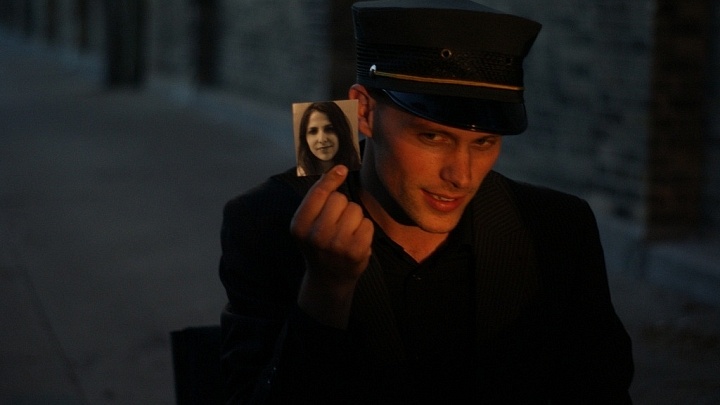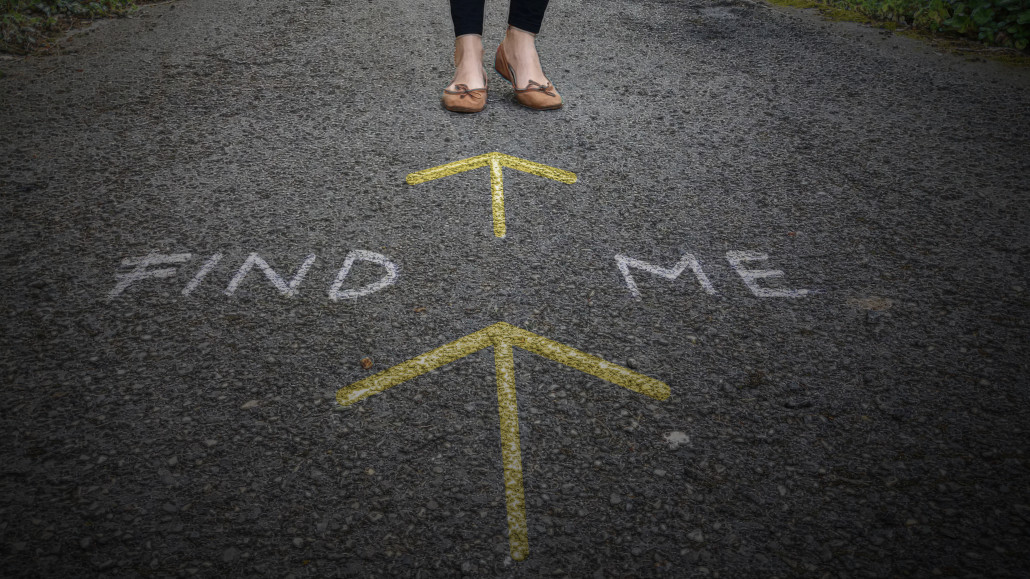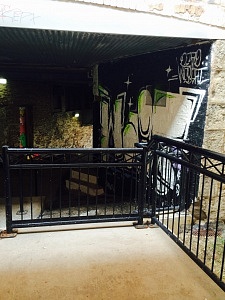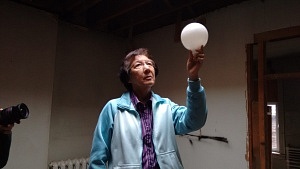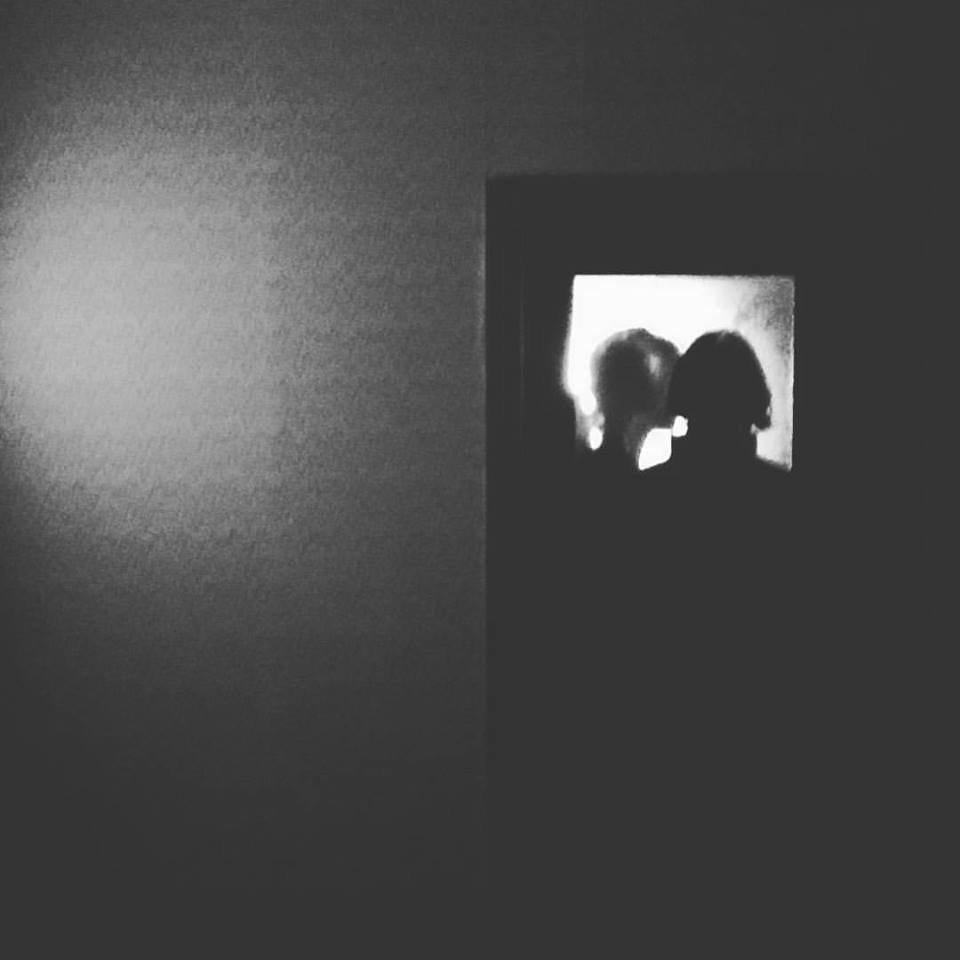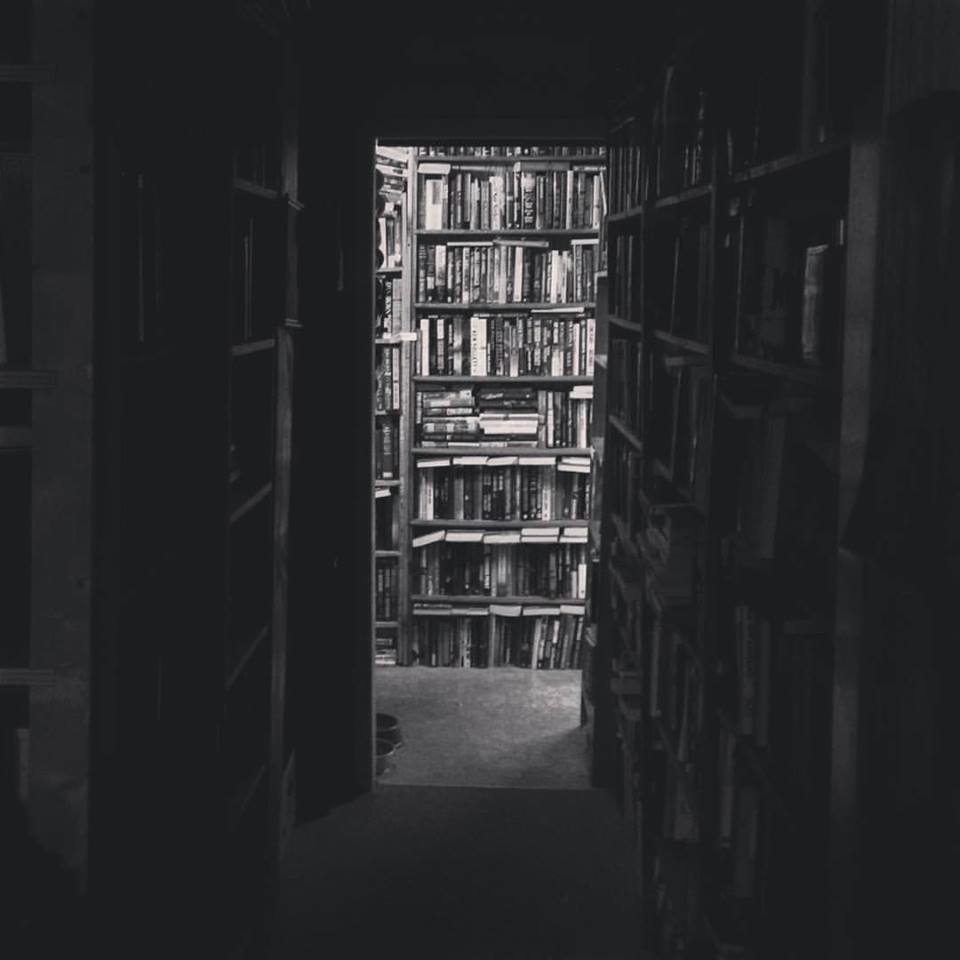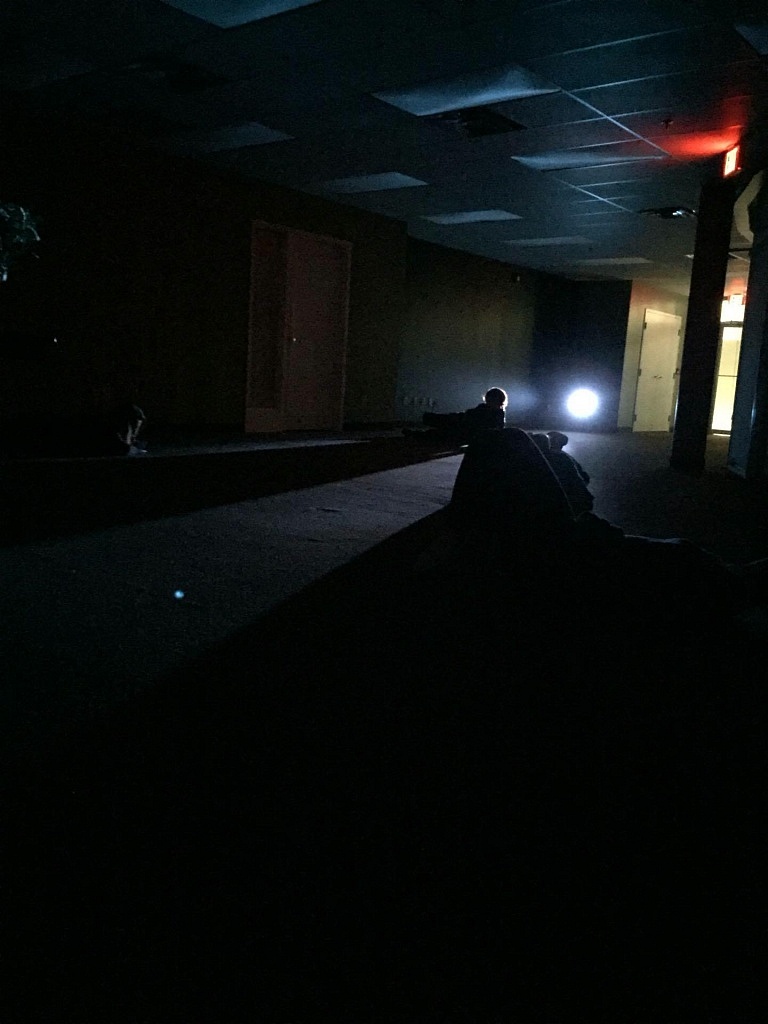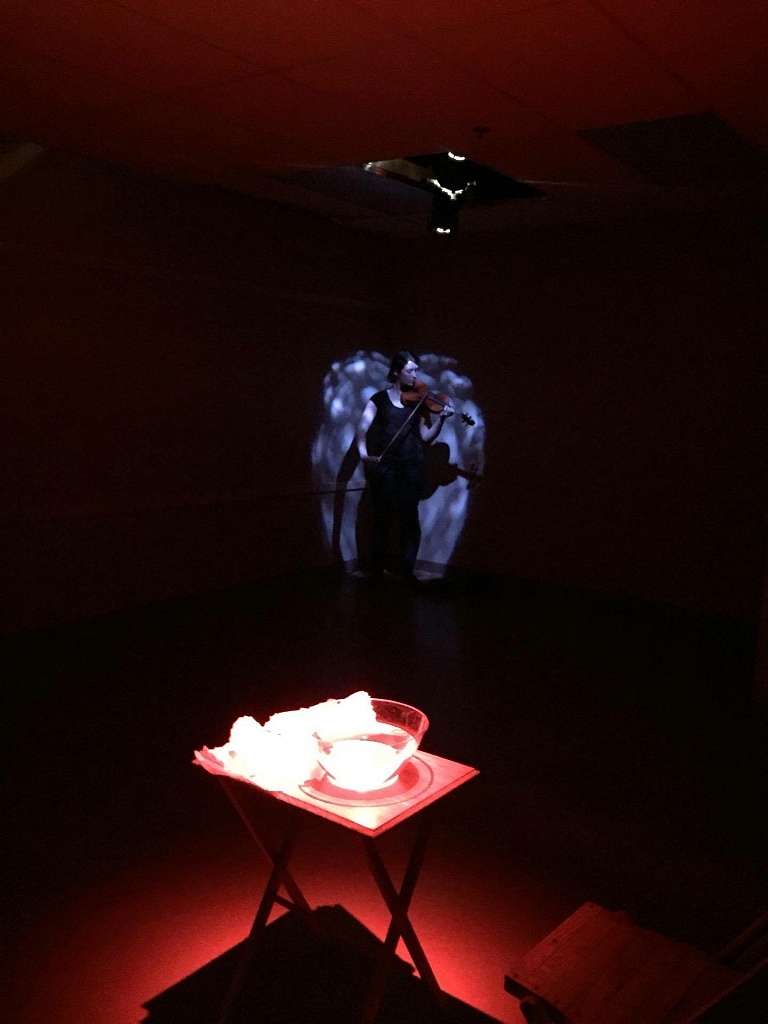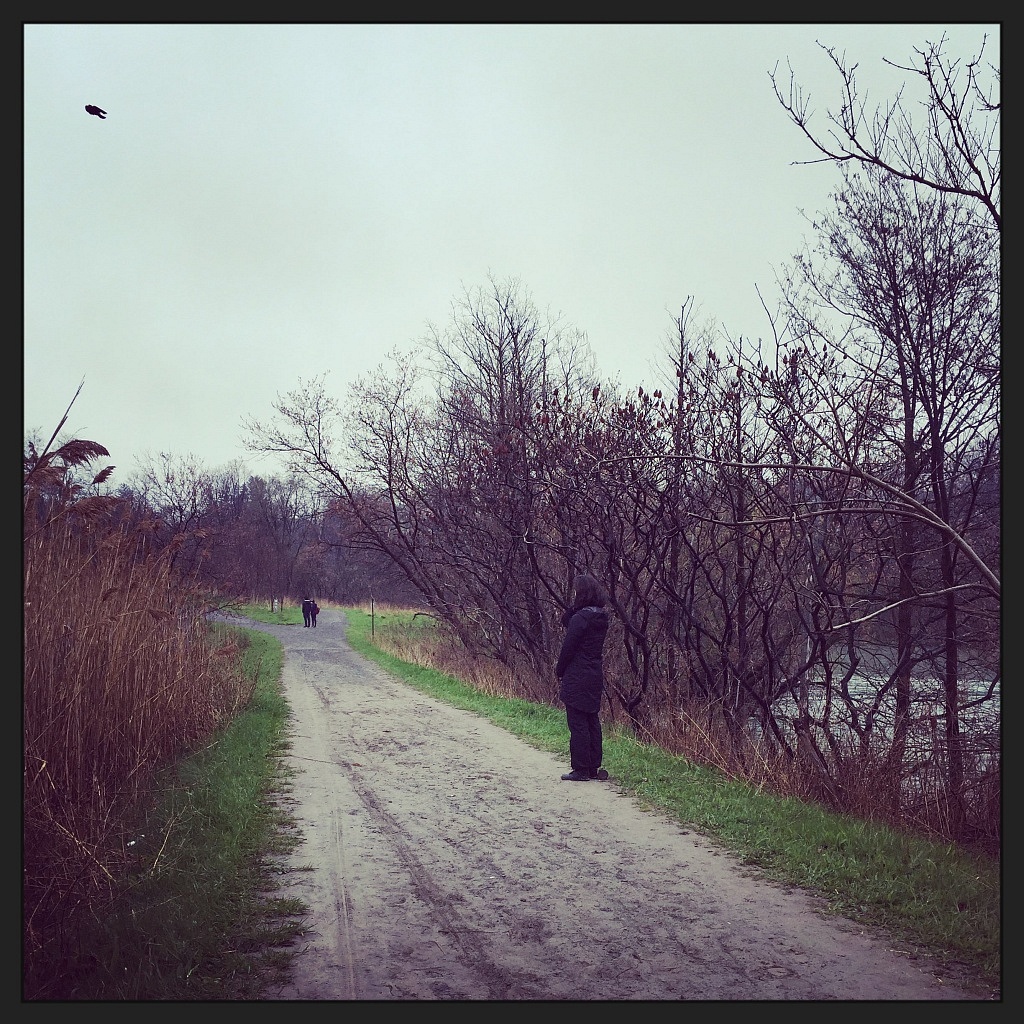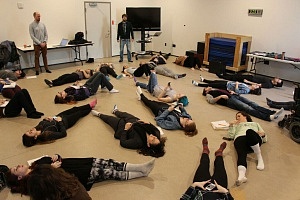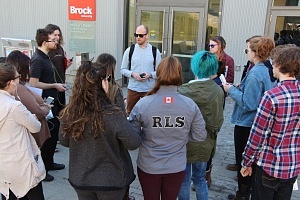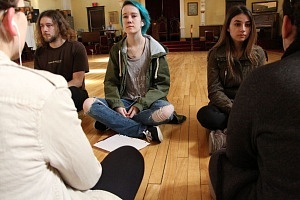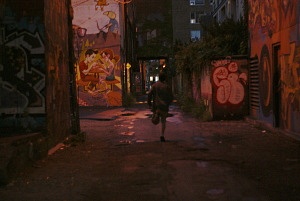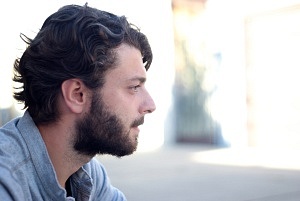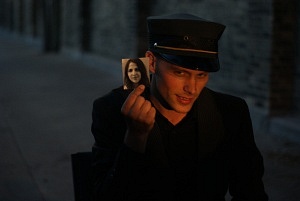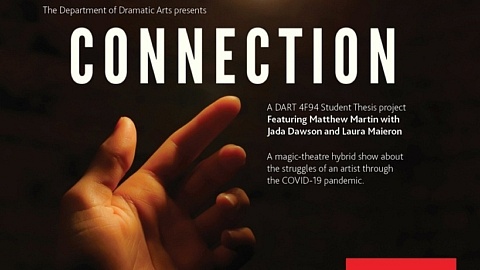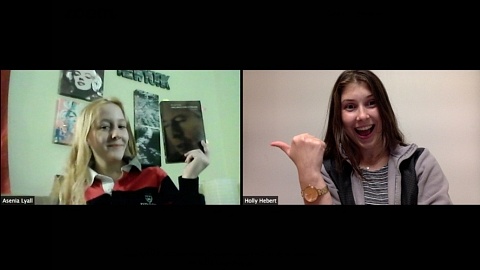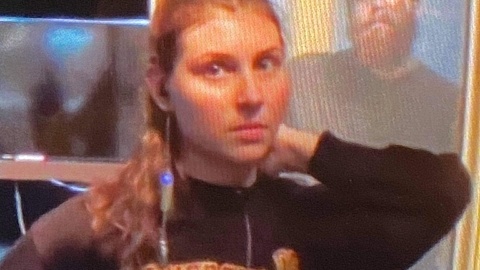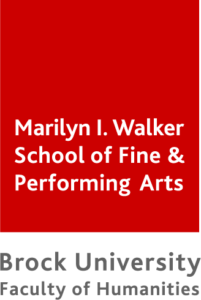“The magic of theatre” – a common descriptor of productions and a personal favourite explanation as to why I love the arts. Theatre has an ability to...
Making a ‘Mess’: Taking Theatre to the Streets of St. Catharines
By DART Critics
Welcome back, readers! Since we’ve been quiet for quite some time now, we will reintroduce ourselves. We are Raylene Turner, Alex Tomulescu, Jonah McGrath, Heather Allen, and Andrew Von Lukawiecki. For our Theatre Criticism class we are working as embedded critics, getting the inside scoop on what went on in rehearsals for a production called That Ugly Mess That Happened in St. Catharines. The secretive, unpredictable, and surprising aspects of this show would have made it quite difficult to reveal much without spoiling it.
So after several initial blogs we held off on publishing any more of our observations until after the production was over – but here we now are, back in action, ready to give you every detail you’ve been dying to know. In this final post we’ll describe our privileged experiences attending rehearsals in the final weeks before the production premiered in St Catharines’ In the Soil Festival from April 29 – May 1 of this year; and then tell you what it was like to actually experience the 72-hour production as spectator-participants.
Andrew here. My rehearsal experience began at the Core Block building in downtown St. Catharines. Director Daniele Bartolini briefed me on my role and the roles of my peers throughout the remaining rehearsals. He told me that I was about to experience stand-alone snippets/works in progress which I would partake in or simply observe.
From here I was sent on my way to the stairway under the bridge to the Meridian Centre. There I encountered one of the actors, Evan Vatri, who was performing as a real estate agent. He was standing out front of a building and informed me that I had just missed the open house by half an hour, but that he was more than willing to talk to me and answer any questions I may have had. I experienced difficulty pursuing any conversation. I found myself freezing up on the spot thinking of what I should say to get the answers I was looking for.
Thankfully, Evan was very adaptive during this conversation. He was very patient with me and did a wonderful job of getting me back on track if I ever felt lost. He gave me information about his employer, Lily, and told me about how she had been gone for a while. Apparently, she gave no notice prior to leaving. After another few moments of discussion, Evan told me about another apartment that he could show me if I met him there in a few minutes. “See you there,” I retorted and I headed on my way.
The apartment Evan sent me to was above Beechwood Doughnuts on James Street. The door to the complex was locked and while I was loitering around in front of the apartment, Maggie, the assistant director, who had been watching me the entire time, walked up and pointed across the street at a man in a green jacket, and said I should go talk to him. I did just that. The name of this character was Gabe. He said that he did not know anything about the apartment but that he did know Lily. Gabe said that he had not seen her for a while and that she had left for “personal reasons.”
This interaction was much easier than my first interaction with Evan. I had got into the swing of things and these conversations were becoming less and less strenuous. Gabe recommended that I take a walk with him, so I did. We went back to the Core Block where I had begun my quest.
I felt this preview contained a multitude of exhilarating experiences. There is an immense joy in being part of a secret world where everything you do is important. It was genuine fun and definitely served the purpose of making me excited for the entire performance.
Raylene here! On a warm, lovely evening in the third week of April, I travelled to my assigned destination, the Core Block in downtown St. Catharines. I got the OK to enter a large room with a desk in the centre of the room, and a woman seated there. She asked me my name and if I was there to meet Mr. Eks – and informed me I was not on the list. I found myself trying to play along, making stuff up on the spot. She proceeded to lead me into a room with a single chair in it facing the corner. She told me to sit there and wait for Mr. Eks, and to my surprise I followed her instructions – but how weird is that? She then came back and said I had to go into another room because “this one needs to be used soon.” So I did. This happened three more times. I finally got into Mr. Eks’ office and it was pitch black. I am quite fearful of the dark so I was very hesitant to go in and sit on the chair, especially because there was a man laying on the ground behind it (what the heck?!). But I mustered up the courage and sat down.
He asked me peculiar questions like, “Do you ever feel like running away?” and “Do you feel uneasy walking alone at night as a woman?” I was a bit caught off guard but the questions actually made me think deeply. He soon informed me that he had been working on this case (the one to find the missing girl, Lily) and I realized he was setting up the premise of the show. A few weeks later when I participated in the actual show, in the same room there was a light on and a stereo with the man’s voice recorded. I enjoyed this a lot more since it was less sinister.
The rest of the rehearsal process was Maggie (the assistant director) bringing me to different people around downtown St. Catharines. Each person described Lily differently, from her age and whereabouts, to her appearance and behavior. I felt as if I was a detective and the further I got, the more I yearned to discover where Lily was. At times it was difficult to be serious with some actors, as I knew them personally. But overall, it got me excited for the show and I appreciated just how much work was put into this.
Jonah here. As a foreword, I would like to say that during the rehearsal process I felt confused, though I participated in many of the same things the other embedders did. At the start of my session, I entered the Core Block building. An actor, Rory de Brouwer, then led me down James Street to the coffee shop Fine Grind. At the back of the shop sat the actor Danielle Wilson, who is also a professor in our department. We approached Danielle and Rory proceeded to initiate a conversation with her. Much was discussed in the following half hour, from the global trend of lowering attention spans, to Danielle’s past romantic relationship with the missing person Lily.
At one point Rory left the room to take a phone call and I jumped on the opportunity. I relinquished my role as a fly on the wall and struck up a conversation about the unusual tribal art decorating the shop. This interaction made me feel oddly exhilarated. We gave our full attention to each other and engaged in the pure, honest, and simple human connection that is conversation. As time went on, I slowly came to realize that That Ugly Mess That Happened in St. Catharines is not simply a shallow mystery story with the immersive theatre label stamped on top. It is an attempt to re-familiarize citizens with the society and environment in which they live, to reestablish intimate human connection in an increasingly technology-infused world.
We’re all back now! Having given you some impression of rehearsals, we’re going to share impressions of the 72 hours of the show. We found that many of the scenes that we were shown in rehearsals were not used in the production; rather, scenes with people we had never met before took their place. On April 29th each of us individually received an email from an unknown source telling us about a person named Lily and describing the events of her morning. We then promptly received a second email giving us an instruction to be at a certain place in the city that evening.
I, Alex, felt nervous to start this journey. As in Raylene’s rehearsal experience, it began with a secretary leading me through a wild room chase. Here I was asked to help Mr. Eks in finding Lily. As Mr. Eks’ voice faded out with a maniacal laugh at the notion of St. Catharines being an “evil city”, Rose, the secretary, opened the door. She handed me a map and before I was on my way she revealed to me that she was also a travel agent and to come see her sometime to book a “trip.” I use the term “trip” loosely since all the trips she described sounded like abstract, drug-induced visions. From hanging coffins to floating gardens what she said left me feeling the trip would be profound. The map she gave me sent me to Mahtay Café to meet Mr. Eks, but on my way there Gabe (Rory de Brouwer) intercepted me. We knew him from the embedding process and so I wasn’t surprised to see him; after some awkwardness we began to walk. He asked me, “Beatles or the Rolling Stones” I replied, “The Rolling Stones, but I loved the Beatles during high school.” He asked me, “You know the song Revolution Nine?” and he quoted the ending of the song where “number nine” is repeated. Suddenly, we were standing outside of 9 James Street.
Thanks for reading this far! Jonah again. We have found that that although we had somewhat different experiences the broad story lines we followed were the same. At the end of our our eerie run-in with Gabe he told us to find a person sitting on the steps of the Courthouse and to follow them. We did just that and found ourselves at a bookstore on Queen Street. We saw a girl inside indicating to the back of the bookstore where we saw another girl. As we approached through the maze-like shop, she turned.
Alex was told she was late, to which she responded, “I walk slowly.” Between the bookshelves I was told to read a passage from a book. I read. The girl sighed. This interaction felt so intimate – and it only got more intimate from there. She said to me that we needed to speak more privately and took me to different, cramped areas of the library. I thought to myself that this type of theatre reestablishes a connection with the audience, and felt that I would only get back as much as I give in the production. “Libraries are not infinite. The mind is.” I told her. Pleased, she told me to follow her to her office. Her office turned out to be a tight space in the farthest corner of the store. We sat so that our heads wouldn’t hit the low ceiling. She asked me to tell her how I was, but without speaking. After a few moments, a book fell and this broke our gaze. She told me it was time to go, and this was the end of our journey that day.
Heather’s perspective coming at you! Being involved in That Ugly Mess twisted my reality, making me believe that I was on a mission to find this missing person, Lily. I feel fortunate to have experienced this production that brought me to areas of St. Catharines I had never been to before. Two scenes in particular really stand out because they affected my mind and body. On Saturday night, April 30th, I experienced the second-to-last scene of the show that was referred to as the dream sequence. My call time was at 10:40pm and was told to go to the building in the Core Block. I was lead through a dark room where every character/actor I had encountered over the past two days were lying on the ground asleep.
As I passed them it felt eerie and very invasive to watch these people rest. I was lead to the back of the building where I entered a dark room illuminated by the red exit sign over the fire escape. As my eyes adjusted to the darkness, I noticed three characters, all women, one playing a violin and the other two awaiting my arrival. They washed my hands and in the red light the water looked like blood. This scene made me feel anxious and uncomfortable. I left downtown and went home feeling lost.
I felt being an audience member and an embedder had both hindered my experience and benefited it. Some of my best friends were involved in the show, and pretending they were strangers was difficult and at times cut me off from the storyline. On the other side of the coin, however, the very last part of the show, called the funeral scene, completely challenged the barriers of my reality.
It brought tears to my eyes because I felt as though I was walking the path to my own funeral, and I was gradually visualizing my family and people close to me. By the time I finished the scene I was in tears. I realized what it would be like to see your loved ones go to your funeral. It made my stomach turn and I had to process this for a couple of hours afterwards.
And voila! Here’s our big finish. Overall we all feel this type of theatre is incredibly engaging, thought provoking, and could change the way people see the arts. That Ugly Mess gave us a new perspective on life and how certain choices can affect so many people.
Now we’re at the end of our embedding experience. We hope we gave you a thrilling inside look into this show. If you ever get the opportunity to partake in this form of theatre, we say, do it! You will not regret it.
March 27, 2016
Heather Allen, Jonah McGrath, Alexandra Tomulescu, Raylene Turner, and Andrew Von Lukawiecki write: Hello, and welcome back! We have so much to fill you in on since our last blog. The mystery of That Ugly Mess That Happened in St. Catharines continues!
Although much has happened, it is still difficult to begin writing this piece because of the secretive nature of this project. We cannot go too far into detail of the rehearsal processes just yet — but we can provide detailed analysis of a workshop in which we learned more about the background and approach of DopoLavoro Teatrale (DLT), the company producing the Ugly Mess show, which they are staging at the very end of April.
This workshop was for all the students in our theatre criticism class, DART 3P96, and was conducted by DLT’s artistic director Daniele Bartolini and Rory de Brouwer, one of the company’s other core members. It took place in a studio in our department as well as in downtown St. Catharines and gave us the taste of the style in which the company creates theatre. Over two successive Wednesday mornings (March 2nd and 9th), we were immersed in a condensed version of the experimental processes DLT uses.
The first day began with an open discussion on criticism, theatre, and art. Daniele and Rory asked us various seemingly simple questions: “What are the rules of theatre?” and “What is good theatre, what is bad theatre?” Our class was eager to answer — some people believed that anything could be considered art, where others advocated for an Aristotelian form in which unity and consistency are valued. Everyone struggled to say the right thing. The two wrote down our answers on a white board and that’s when we realized they were about to prove all of our answers wrong.
Daniele began to explain where his inspiration for his own type of creativity first began. He was fascinated with Samuel Beckett and his way of breaking all the rules of theatre. Beckett stripped away many elements that were considered essential – dialogue, and actors’ bodies and voices among them. Daniele felt a calling to continue in this line and find new ways of eliminating expected elements of theatre to achieve an intimate connection with the audience. This idea catapulted him towards a variety of innovative methods and experiences. He is constantly looking for new places in which to set his shows. Slowly but surely, he reintegrated the audience into the theatre experience so that that experience becomes entirely their own; the audience becomes the actor. He’s created multiple shows where intimacy is created with the audience by having their experience become the story.
After this enlightening conversation, Daniele further explained DLT’s intentions with Ugly Mess. While there will be performers working for the company, guiding audiences through the journey, ultimately it is the individual spectator who will generate the narrative of the show. Daniele makes a distinction between the kind of work DLT makes, which they call audience-specific theatre and other practices that might be called immersive. The point, he underlines, is to activate the artist in all of us.
The class was then instructed to leave the building and venture around the downtown area on our own for approximately forty minutes, recording an impression of a specific place we discovered through photo or video or writing. We then shared our impressions with two other classmates and were given the homework of describing, analyzing, and critiquing the impressions our other group members had taken. In doing this, the class got a sense for what it’s like to participate in, and start to critique, audience-specific theatre.
The second day of the workshop gave us more of a hands-on interactive experience. The activities we undertook on this day were inspired by Ugly Mess, as well as some of DLT’s past productions. Daniele and Rory began by sending all the students audio files via email. We then put on headphones, lay on the floor of the studio, and to begin listening to an audio track which started to tell us about a young person who’d lost their way. This clever implementation of technology managed to create a sense of personal intimacy in the crowded studio room. Suddenly a person was speaking directly to you and you were reacting to those words as an actor in the journey.
Soon enough, we found ourselves migrating to various locations in the downtown St. Catharines area, instructed by further audio and by live instruction from Daniele and Rory. We were instructed to find various clues which sent us to two different locations above popular establishments downtown. In these settings, we took part in activities that encouraged us to reexamine our relationship with the city and with our peers. One activity had us hiding hand-written notes about our intimate fears in a deserted suite of offices. The other took place at the working space of Suitcase in Point theatre company, across James Street from the other location. There, activities were more structured, and similar to the techniques of applied theatre. There was dancing, conducting a personal interview with a partner, and then recording and playing back some thoughts about a person in our lives we miss – which turned out to be quite heart-wrenching. After undertaking this whole journey, it is clear to us that DLT is committed to establishing a connection between the individual and an increasingly depersonalized, mediatized world.
We felt as a team this experience was a great sampler of the creative possibilities that these kinds of interactive theatre practices bring to the arts. It was like going to a performance version of Costco where DLT had a sample booth and we were the taste-testers. If you are interested in continuing along with this flavourful journey, tune in for our next post and get a mouthful of Ugly Mess.
February 22, 2016
Heather Allen, Jonah McGrath, Alexandra Tomulescu, Raylene Turner, and Andrew Von Lukawiecki write: Hello readers, and welcome to the beginning of an extremely unique creative journey. Let us first introduce ourselves: we are embedded critics following the making of That Ugly Mess That Happened in St. Catharines. Our job is to observe and record the rehearsal and creative process of this ambitious theatre piece created by Dopo Lavoro Teatrale (DLT), which will be performed over the course of three days (April 29 – May 1) in different locations around the city of St. Catharines.
This embedding experience makes us the odd ones out in our class, DART 3P96, in that this show will be happening after our academic term is over and is not taking place within the physical confines of a theatre because it is an immersive performance piece – a form quite different from what most people think of as a regular theatre experience. In immersive theatre the audience is involved in whatever way the company wants and are, for all intents and purposes, given a role. At this point in the process we can tell you no more about the show than the company itself knows; That Ugly Mess will evolve and reveal itself with each work session.
DLT’s previous show, The Stranger — which they have performed in Toronto and Vancouver over the past several years — was similar to That Ugly Mess but on a smaller scale. That show took place within the course of three hours; in it one audience member at a time took a walking journey through a city meeting performers and having interpersonal experiences along the way. Everything about That Ugly Mess is on a much bigger scale – it’s going to be three days long, for example, rather than three hours! — and the company is using as many local resources in St. Catharines as possible. We are one of them; as a group we are in close contact with the director, Daniele Bartolini, whom we first met via Skype.
Prior to this first meeting we were all unsure as to how exactly this show would work. We knew that the basic premise had something to do with the search for a missing person in St. Catharines. We had many urgent questions such as: Who gives out the clues? How will the participants move from one place to the next? Will the police be informed about the show? This last question was a big concern, seeing as the immediate reaction for most people when hearing that there is a missing person is to inform the authorities. Not everyone will know this scenario is a performance — so how will the rest of the community be informed? Hoping to have these questions answered we sat, with Daniele up on a big screen, and jumped right into our first meeting with him.
What we learned is that this production will be an epic quest in which the audience/participants will accumulate clues and solve a mystery. Daniele talked about these clues being given by actors at bars and cafes, through social media, and via text message. Daniele had great ideas for small snippets he wants to include, as well as an overall structure, but we left the conversation without much insight into plot.
Daniele did, during this first Skype meeting, express wishes to create genuine confusion in the St. Catharines community. He stated that he wants people to feel uncertain about the legitimacy of the story being presented in That Ugly Mess. This would mean that, ideally, some would understand the story that the show tells as fictional while others would believe all the information being given to them. One thing, which Daniele and his team are now focusing on, is how to accomplish all of this while still being sensitive to the city’s troubled history (by this we refer to the infamous case of serial killer Paul Bernardo and the multiple disappearances of women in St. Catharines in the ‘90s).
You may be wondering at this point, “How does one go about creating a show like this?” We were, and still are, finding our way through the concept of this ever-evolving creation. Luckily enough, two of our group members, Heather and Alexandra, had the opportunity to sit in on one of the first meetings for the show. They arrived, about two weeks after our first meeting, at Suitcase in Point theatre company and gathered some immensely enlightening information. As they were introduced to everyone at the meeting, it became apparent how closely DLT will be working with not only Brock University, but the entire St. Catharines community. The owner of Mahtay Café on St. Paul Street; the editor of the independent newspaper The Sound; and Deanna Jones, co-artistic director of Suitcase in Point and co-organizer of the In the Soil Festival (which is presenting the production) were all there. Our classmates Julia Scaringi and Evan Vatri were also present; they will be performing in the show, stationed at various locations in St. Catharines to interact with audience members and give them clues. Several other Dramatic Arts students are involved in the show including second-year student Maggie Hunter as assistant director.
The meeting started with a reiteration of what our group already knew about the project, for the benefit of the newcomers, but also gave us some new information. Daniele explained how large the project is going to be and how much work is going to be put into it. We thought it would only take place in downtown St. Catharines, but Daniele suggested it would be stretched even wider throughout the city. There will be many events occurring at the same time — musicians playing here, actors stationed there, texts sent at various intervals. It is evident that the project needs to be extremely organized and communication amongst all of the creators is essential. Throughout the meeting Daniele shared his passion for immersive theatre. One of the things he enjoys most about this type of theatre is the way audience-participant and artistic voices are both utilized to create the world of the play. He is very adamant about the audience being in control of the story and of their individual level of participation.
Our struggle to comprehend exactly how this project works and to describe it in this blog is – as we’ve been saying — a big challenge, but our understanding took a big leap forward when Daniele summed it up in this meeting as a “game inside a box.” Essentially, participants will be given the opportunity to create an alter ego for themselves inside a new reality. Any fans of sandbox video games or live-action-roleplaying will find this concept familiar. His vision requires there to be a set narrative that audience participants can easily understand. Who the missing person at the centre of the show will be remains a mystery even to Daniele because he feels that this material should come naturally through improvisation. Using improv, in his view, will provide a sense of authenticity that the audience will find compelling. Improv throughout the creation process as well as during the actual performance of the show will allow for the feeling of a genuine experience that Daniele is striving for. It can be said, without question, that Daniele displays a laid-back directorial style. Instead of meticulously planning out the specific details of the show he intends to “go with the flow” and to allow the community’s involvement to shape and morph the project over the course of the next several months.
For locals, involvement with this project will allow them to rediscover their city. Audience participants should feel newly immersed in an otherwise familiar urban setting as they work side by side with the actors in forging a narrative. The actors will all have a certain distinction about their appearance so the audience will be able to identify them as a part of the production. In this way each person who becomes involved in this piece will take part in creating a story that is completely unique to her or himself. The actors will need to be quick on their feet and able to work with whatever the audience participants throw at them. Auditions took place after Heather and Alex’s meeting with the team, and we’re waiting to hear about the resulting cast.
What we have learned about this production through independent research and in two meetings has piqued our interest. Acting as embedded critics during this show will be a new type of experience for all of us. We are excited to witness such a largely new and innovative undertaking flourish in our home, St. Catharines.
In our future posts we are hoping to be able to give more insight into the plot of this ever-changing production as we attend rehearsals and talk more with the creators. We will eventually fill you in on the reactions of audience-participants to this production. Will these reactions be what the director, Daniele, and the rest of the production team are looking to achieve from That Ugly Mess? Only time will tell. We hope you’re just as intrigued as we are; there’s a lot more to come, so stay tuned. Until next time!
Related Posts
It’s been a few weeks since the final performance of Brock University Department of Dramatic Arts’ Fall Mainstage, Scenes from an Execution. Closing off their...
Here’s Holly Hebert’s final solo vlog from behind the scenes of the Fall 2020 DART Mainstage, Scenes from an Execution. She and Asenia will round off this...
It’s been a few weeks since the final performance of Brock University Department of Dramatic Arts’ Fall Mainstage, Scenes from an Execution. Closing off their...
Here’s Holly Hebert’s final solo vlog from behind the scenes of the Fall 2020 DART Mainstage, Scenes from an Execution. She and Asenia will round off this...
Leave a Reply (Cancel Reply)
Twitter Feed
Blogroll
DARTcritics.com is partially funded by the Marilyn I. Walker School of Fine and Performing Arts, in support of student learning; experiential education; student professionalization; public engagement with the teaching, learning and production activities of the Department of Dramatic Arts; new ways of thinking; and the nurturing of links with our communities.

